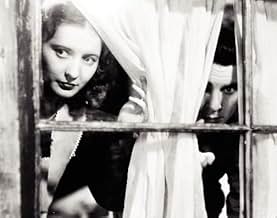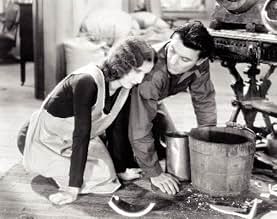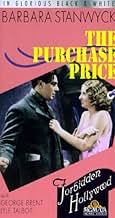Ajouter une intrigue dans votre langueA torch singer becomes a farmer's mail-order bride.A torch singer becomes a farmer's mail-order bride.A torch singer becomes a farmer's mail-order bride.
- Réalisation
- Scénario
- Casting principal
Mae Busch
- Queenie - Girl on Train
- (non crédité)
Nick Copeland
- Skins' Pal at Shivaree
- (non crédité)
Mike Donlin
- Tom Buchanan - Man at Shivaree
- (non crédité)
Harrison Greene
- Man in Hotel Lobby
- (non crédité)
Crauford Kent
- A.C. Peters - The Banker
- (non crédité)
Matt McHugh
- Waco - Fields' Henchman
- (non crédité)
John 'Skins' Miller
- Skins - The Accordion Player
- (non crédité)
Carlyle Moore Jr.
- Hotel Desk Clerk
- (non crédité)
Edmund Mortimer
- Dance Extra
- (non crédité)
William H. O'Brien
- Waiter in Opening Nightclub Scene
- (non crédité)
Henry Otho
- Extra in Beer Hall and at Shivaree
- (non crédité)
Avis à la une
This peculiar but interesting drama has Barbara Stanwyck as a weary nightclub torch singer with a "who cares?" attitude. To escape her underworld boyfriend, she decides to hide out in the bleak plains of North Dakota as a mail-order bride. As her shy farmer husband, the normally debonair George Brent is almost unrecognizable in a pair of overalls, but gives a sensitive characterization. The bulk of the plot follows the growing feeling between the reserved country mouse' and the tough city mouse', complicated by several villains. Tough guy director William Wellman keeps things moving at a clip, and uses his low budget wisely to stage several good set-pieces, including a drunken shivaree for the happy couple. In the supporting cast, Leila Bennett stands out as a plain-talking maid.
This is sold as "pre-Code," as if there will something risqué or shocking, but certainly by today's standards -- or lack thereof -- and even by those of the era, there is nothing to bother your grandma or even your (reasonable) preacher.
There is something, though, to excite the movie-lover: Barbara Stanwyck's performance.
Apparently in real life she was a pretty tough cookie, and certainly she played some hard women in many of her films.
In "The Purchase Price" her character refers to herself as having maintained some sort of a reputation and in fact she comes across as a very nice, even admirable person.
She certainly looked good, with a gentle strength, or strong gentleness, poking out of the chorus girl/mistress persona.
The story, though, never does make much sense, and why the people did what they did, except for the character played by Lyle Talbot -- in a great role for him, and excellently played -- is not clear.
One more glaring error: North (brrrr) Dakota doesn't have any hills, and the shots of snow-capped peaks showed that wherever this film was shot, it sure wasn't North (brrrr) Dakota, you betcha.
One scene of plowing showed the genuine agoraphobic look of that state, where neither hills nor even trees are native. Except for cottonwoods along the creeks and rivers, what trees there are in North (brrrr) Dakota have had to be brought in from the real world.
Plus North (brrrrr) Dakota drunks and brawlers are not Irish and Scots, as this movie implies, but Poles and Czechs and Germans, sometimes even Norwegians, unless they are Lutherans then, of course, they don't drink or brawl. And if you don't believe me, ask their preachers.
Anyway, watch this for Stanwyck and suspend your disbelief about all the rest. She is worth spending your time.
There is something, though, to excite the movie-lover: Barbara Stanwyck's performance.
Apparently in real life she was a pretty tough cookie, and certainly she played some hard women in many of her films.
In "The Purchase Price" her character refers to herself as having maintained some sort of a reputation and in fact she comes across as a very nice, even admirable person.
She certainly looked good, with a gentle strength, or strong gentleness, poking out of the chorus girl/mistress persona.
The story, though, never does make much sense, and why the people did what they did, except for the character played by Lyle Talbot -- in a great role for him, and excellently played -- is not clear.
One more glaring error: North (brrrr) Dakota doesn't have any hills, and the shots of snow-capped peaks showed that wherever this film was shot, it sure wasn't North (brrrr) Dakota, you betcha.
One scene of plowing showed the genuine agoraphobic look of that state, where neither hills nor even trees are native. Except for cottonwoods along the creeks and rivers, what trees there are in North (brrrr) Dakota have had to be brought in from the real world.
Plus North (brrrrr) Dakota drunks and brawlers are not Irish and Scots, as this movie implies, but Poles and Czechs and Germans, sometimes even Norwegians, unless they are Lutherans then, of course, they don't drink or brawl. And if you don't believe me, ask their preachers.
Anyway, watch this for Stanwyck and suspend your disbelief about all the rest. She is worth spending your time.
She may be dressed down for the farm wife's part, but this is Stanwyck at her youthful loveliest. So, can Joan (Stanwyck) adjust to the rigors of rural life after the glamor of big city nightclubs. If you can buy her becoming a mail-order bride as an alternative, you might buy the rest. Seeing her city girl alone on the vast Canadian prairie, suitcase in hand, waiting for her intended, does present a stretch. Nonetheless, now she's got purpose in life, no longer just a meaningless rich man's ornament. I do wish Brent as her mail-order hubby showed a little charm, something that would help us believe she would stick with her new life. Instead, he's overly dour and insensitive, wanting to manhandle her on their wedding night. Getting the two in step with each other makes up the movie's main part.
The movie's quite good at showing the rigors of farm life—the primitive farm house, the constant grubby toil, the relative isolation. I expect Dust Bowl audiences could identify with these demanding aspects, especially when the bank threatens to repossess Jim's (Brent) farm. That Joan manages to stick it out and thrive suggests that behind city decadence lies a common humanity and hidden grit-- a good message for that time and maybe any.
Anyway, pre-Code doesn't disappoint as Stanwyck gets to show off fancy and not-so-fancy underwear. Then too, sleeping arrangements leave little in doubt. Note too, how little is done to prettify either the rough-hewn people or their lives, even though most are stereotypes. Also, I could have done without the barking idiot as comedy relief. All in all, this Warner Bros. antique (1933) remains a fairly interesting little programmer, with a humane underlying message.
The movie's quite good at showing the rigors of farm life—the primitive farm house, the constant grubby toil, the relative isolation. I expect Dust Bowl audiences could identify with these demanding aspects, especially when the bank threatens to repossess Jim's (Brent) farm. That Joan manages to stick it out and thrive suggests that behind city decadence lies a common humanity and hidden grit-- a good message for that time and maybe any.
Anyway, pre-Code doesn't disappoint as Stanwyck gets to show off fancy and not-so-fancy underwear. Then too, sleeping arrangements leave little in doubt. Note too, how little is done to prettify either the rough-hewn people or their lives, even though most are stereotypes. Also, I could have done without the barking idiot as comedy relief. All in all, this Warner Bros. antique (1933) remains a fairly interesting little programmer, with a humane underlying message.
This film deals with Stanwyck, who works as a singer in New York. She has been working the nightclub circuit since she was a teenager and is romantically involved with the leader of the underground crime world. Fixture of the pre-code world, Lyle Talbot, portrays the underground kingpin. Because breaking up with such a powerful man, like Talbot, may prove to be difficult, Stanwyck opts to escape to Montreal. In Montreal, she resumes her career under a new name. Stanwyck is spotted by one of Talbot's henchmen. In lieu of returning to Talbot, Stanwyck hatches a scheme with the maid at her apartment building. It seems that the maid has been corresponding with a North Dakota farmer, George Brent, who is looking for a mail order bride. In one of her letters, the maid mails Stanwyck's picture instead of her own, because she finds the youthful Stanwyck more attractive than herself. Sensing the perfect plan, Stanwyck offers to pay the maid two month's worth of wages if she can go to North Dakota in her place. The maid agrees.
Stanwyck and Brent marry and soon it's Stanwyck's turn to learn about life on a farm during the Great Depression. On their wedding night, Brent tries to make advances on new wife Stanwyck to consummate their relationship, but she turns him down and forces him to sleep elsewhere. I know they're married and all, but I don't blame her, she literally just met and married him that same day. I imagine however, that sex probably comes with the territory as a mail order bride. But I digress.
For most of the film, Brent is aloof to Stanwyck and keeps his distance. She genuinely begins to embrace life on the farm and learns how to sew, cook, clean, etc. She is friendly with the neighbors and even helps a neighbor who has recently given birth. Stanwyck helps out with the baby and even instructs a young Anne Shirley how she can help her mother who is recuperating from the birth.
The main conflict in the film, aside from Brent's unhappiness with Stanwyck, is that he is broke and will lose his farm if he cannot pay his back bills. His saving grace however is that he owns a strain of wheat that grows well and is of high quality. He's sure to sell his wheat if he grows and harvests it. Brent and Stanwyck are finally on the same page and work together to save the farm.
This was an okay film, definitely not among one of Stanwyck's best. It definitely doesn't rank up there with my favorite Stanwyck pre-code, Ladies They Talk About. She gives the part her all, even though the plot is somewhat absurd. Brent is just there. He doesn't do much except give Stanwyck the silent treatment. But then this strong silent type was probably Brent's interpretation of a farmer of Scandinavian ancestry living on the Great Plains.
There were definitely some pre-code elements in the film, like Stanwyck walking around the bedroom clad in only a short slip and knee high stockings. She also lays a negligee out on the bed for George Brent to see and get excited, but he's mad at Stanwyck, and won't take the bait.
Stanwyck and Brent marry and soon it's Stanwyck's turn to learn about life on a farm during the Great Depression. On their wedding night, Brent tries to make advances on new wife Stanwyck to consummate their relationship, but she turns him down and forces him to sleep elsewhere. I know they're married and all, but I don't blame her, she literally just met and married him that same day. I imagine however, that sex probably comes with the territory as a mail order bride. But I digress.
For most of the film, Brent is aloof to Stanwyck and keeps his distance. She genuinely begins to embrace life on the farm and learns how to sew, cook, clean, etc. She is friendly with the neighbors and even helps a neighbor who has recently given birth. Stanwyck helps out with the baby and even instructs a young Anne Shirley how she can help her mother who is recuperating from the birth.
The main conflict in the film, aside from Brent's unhappiness with Stanwyck, is that he is broke and will lose his farm if he cannot pay his back bills. His saving grace however is that he owns a strain of wheat that grows well and is of high quality. He's sure to sell his wheat if he grows and harvests it. Brent and Stanwyck are finally on the same page and work together to save the farm.
This was an okay film, definitely not among one of Stanwyck's best. It definitely doesn't rank up there with my favorite Stanwyck pre-code, Ladies They Talk About. She gives the part her all, even though the plot is somewhat absurd. Brent is just there. He doesn't do much except give Stanwyck the silent treatment. But then this strong silent type was probably Brent's interpretation of a farmer of Scandinavian ancestry living on the Great Plains.
There were definitely some pre-code elements in the film, like Stanwyck walking around the bedroom clad in only a short slip and knee high stockings. She also lays a negligee out on the bed for George Brent to see and get excited, but he's mad at Stanwyck, and won't take the bait.
The appeal of this somewhat run-of-the-mill film is Barbara Stanwyck in an early display of her mega-watt star power and her ability to turn mediocre material into something special.
Her character doesn't make much sense: a nightclub singer from the city who wants to get away from the bootlegger boyfriend hounding her and so agrees to an arranged marriage with a farmer up in the wilds of North Dakota! The bootlegger (played by Lyle Talbot) isn't threatening or abusive, so one wonders why Stanwyck needs to go to such great lengths to avoid him -- keep wondering, because the movie never explains it. But if you can swallow that, then you can easily swallow the fact that this urban good-time gal seems to know all about how to run a farm.
Which brings me back to Stanwyck. The movie's premise isn't remotely plausible, but Stanwyck somehow makes it so through the confidence of her performance. I really think she could make anything worth sitting through just for the pleasure of watching her.
The film does provide an interesting look at what farm life in the early days of the 1930s was like, a lifestyle I've only seen recreated in more modern-day movies.
Grade: B-
Her character doesn't make much sense: a nightclub singer from the city who wants to get away from the bootlegger boyfriend hounding her and so agrees to an arranged marriage with a farmer up in the wilds of North Dakota! The bootlegger (played by Lyle Talbot) isn't threatening or abusive, so one wonders why Stanwyck needs to go to such great lengths to avoid him -- keep wondering, because the movie never explains it. But if you can swallow that, then you can easily swallow the fact that this urban good-time gal seems to know all about how to run a farm.
Which brings me back to Stanwyck. The movie's premise isn't remotely plausible, but Stanwyck somehow makes it so through the confidence of her performance. I really think she could make anything worth sitting through just for the pleasure of watching her.
The film does provide an interesting look at what farm life in the early days of the 1930s was like, a lifestyle I've only seen recreated in more modern-day movies.
Grade: B-
Le saviez-vous
- AnecdotesDuring the wheat-burning scene a stand-in was used instead of Barbara Stanwyck, but she didn't think the stand-in acted as the character so Stanwyck decided to play it herself. This resulted in her getting some burns on her legs, but she never complained.
- GaffesWhen Barbara Stanwyck gets off the train in North Dakota the terrain is very mountainous. North Dakota is on the Great Plains - very flat.
- Citations
Eddie 'Ed' Fields: Ya daffy little tahmata, I'm bugs about ya. I'd marry ya myself, if I wasn't already married.
- ConnexionsFeatured in Barbara Stanwyck: Fire and Desire (1991)
- Bandes originalesTake Me Away
(1932) (uncredited)
Music by Peter Tinturin
Lyrics by Sidney Clare and Charles Tobias
Played during the opening credits and at the end
Sung by Barbara Stanwyck at the nightclub
Played as background music often
Meilleurs choix
Connectez-vous pour évaluer et suivre la liste de favoris afin de recevoir des recommandations personnalisées
- How long is The Purchase Price?Alimenté par Alexa
Détails
- Date de sortie
- Pays d’origine
- Langue
- Aussi connu sous le nom de
- Night Flower
- Lieux de tournage
- Société de production
- Voir plus de crédits d'entreprise sur IMDbPro
Box-office
- Budget
- 202 000 $US (estimé)
- Durée
- 1h 8min(68 min)
- Couleur
- Mixage
- Rapport de forme
- 1.37 : 1
Contribuer à cette page
Suggérer une modification ou ajouter du contenu manquant





































